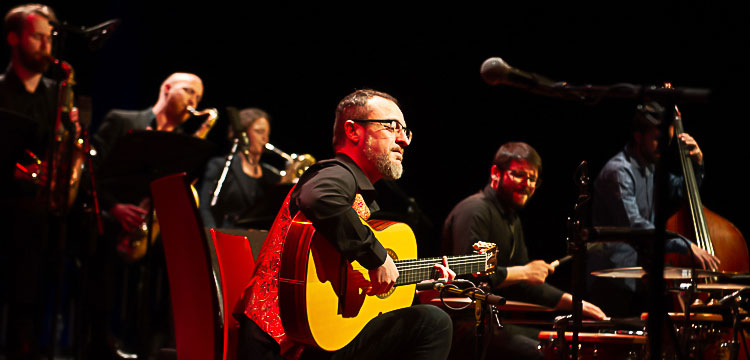Flamenco Biënnale Amsterdam (Bimhuis)
“It don’t mean a thing if you ain’t got that swing” said Duke Ellington, and José Quevedo Bolita seems to respond to that.
José Manuel Gómez Gufi
It was an evening to celebrate music, people giving a standing ovation for their own people as well as ours, theirs being jazz musicians, ours being flamenco. Between one thing and another, “flamenco jazz”, a style of music that began to yield fruit when Paco de Lucía made his sextet in the early eighties, and there were endless followers but few norms. In the last 40 years only once do I remember hearing a musician talk about “true flamenco jazz”, and no one set down any rules. In fact, most jazz musicians confess under their breath that they did what they could with flamenco, and went on to learn. Paco de Lucía himself once asked a colleague: “Hey, how do you improvise?”, I think it’s Al di Meola who says this in “La Búsqueda”. Di Meola couldn’t believe it, because that guy who didn’t know how to improvise, was making them all look stupid night after night when he set his mind to it, Paco was always always the one who came out on top and who played the most meaningfully and beautifully.
José Quevedo Bolita, who is from Jerez, was just 6 or 7 when Paco’s “Sólo Quiero Caminar” came out, being a guitarist in that town is like living at flamenco ground zero. Too close to the big bang, and perhaps to cure that condition, he calls this show “Caótico” and he comes on alone with his guitar, and it seems like that first piece is made up of variations that occur to him, a bit like Dexter Gordon?, a musician who continually cited popular songs (within a torrential discourse). No, I can’t be sure but I think the variations are his own. So you let yourself be carried away by the imagination of a musician who expresses himself with his hands and with half-baked English.
“How do you say compadre in English? He asks the Basque bassist and polyglot Pablo Martín Caminero, who tells him it has no translation. The compadre is Paquito González, a whiz kid on percussion from Sanlúcar. Londro, a singer from Jerez is also there, whose sung verses are easily understood, even in the most babbled forms such as siguiriya, a song that sets me flying like the solos of John Coltrane (and I still haven’t even gone into a coffee-shop).
In the bar of the venue there’s a collection of photos of jazz greats. Duke Ellington is there, from 1958 in the Hague; Miles in 1960, Coltrane with Eric Dolphy and Ronald “can’t-fit-in-another-sax” Kirk. Inside, the flamenco quartet has joined the big band made up of three trumpets (each one of a different style), two trombones, one for rhythm, sax and flute, the guy in charge of the winds, Van Rossem, the tenor and Tini Thomsen, the baritone and bass clarinet. Between one thing and another, the band sounds like Gil Evans, the arrangements of Málaga musician José Carrara are built upon the dependable sound that accompanied Miles Davis in “Sketches of Spain”, in fact one of the trumpet-players is spot-on with delicacy supported by a mute. What’s the difference? Well, that neither Miles nor Gil were ever in contact with real flamenco, and here the flamencos shared their sound right to the last row, and Londro cheers with the same enthusiasm as others might have done to bring them into the fold.
Rumba and bulerías turn up the flamenco heat, and the solos sound natural. Pablo Martín Caminero moves into fifth gear with his bass as if running the band through Mendizorroza, and that elevates the level of the solos. Van Rossem puts subtitles to Bolita and in the encore, the flamenco threesome gets into playing a powerful contagious swing, that of Ellington and Basie, and the band follows happily as if there were no tomorrow.
Photo gallery by © Annemiek Rooymans

Video © Felix Vazquez